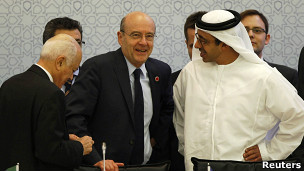|

The United States and its allies must look beyond ISIS and look beyond the narrow goal of destroying one source of extremism and terrorism. Defeating ISIS will do little to bring regional security and stability if it is not tied to efforts to deal with the broader sectarian and ethnic tensions in Iraq and Syria, and to efforts to help the leaders in both states make reforms in politics, governance, and economics that can bring recovery and broader development.
Many aspects of the sectarian and ethnic tensions within Iraq and Syria have grown far worse during the course of the fighting in each country since 2011, and make any lasting form of stability and security even harder to achieve. If these issues are not addressed now, there is a serious risk that ISIS may only be the prelude to far worse problems.
In Iraq's case, prolonged fighting may end in dividing Arab Sunnis and Shi'ites to the point where unity is impossible. It has already left a legacy of tension and conflicting territorial goals between Arabs and Kurds that will divide Iraq along ethnic lines as well as sectarian ones. Sectarian segregation is a growing problem in Arab areas, and the country is increasingly divided into separate economies: the Sunni, ISIS areas in the West, the Kurdish economy in the KRG, the mixed agricultural economy in the East and north of Baghdad, the mixed urban economy around Baghdad, and the largely Shi'ite petroleum economy in the Southeast.
Iraq needs far more than military assistance, anti-corruption measures, or some simplistic approach to federalism. It needs a central government that responds to its sectarian and ethnic divisions in a functional way, and whose leaders and legislators actually represent given constituencies rather than party lists. It needs to agree on a meaningful way of sharing the nation's oil wealth, and to agree on reforms of its government, state-owned enterprise sectors, and agricultural sectors that will be paced at rates that encourage job creation and stability.
Only Iraqis can ultimately shape and agree on such plans, but they need help in forming them and they need it as soon as possible. Here, the United States has already shown it lacks core competence within USAID to conduct such planning, just as the UN and UNAMA have failed in Afghanistan. The World Bank, however, does seem to have such capabilities and a major U.S. effort to support such an aid effort in support of Iraq could help Iraqi political leaders without imposing an uncertain U.S. effort.
In Syria's case, the problem is vastly complicated by the fact more than half the population is either internally displaced persons or refugees and the massive levels of damage done by the civil war. It is also the sheer lack of any credible moderate political center or faction that is a credible source of effective governance and economic reconstruction and recovery. Syria is now so divided and so lacking in unity and effective leadership that its only options now seem to be a paralyzing form of ceasefire, negotiations that cannot produce a stable lasting outcome even if the principals agree, or a form of burnout that can only lead to a "peace" of the vanished and the dead. Defeating ISIS cannot do deal with these problems.
Real progress depends on a level of Syrian initiative, leadership, and cooperation from within - problems even more serious than in Iraq. It cannot take place under Assad, but it is unclear how Syria's factions can agree or who in any faction has the political ability, capability for governance, and economic planning capability to propose a program that even offers real hope. Unlike Iraq, Syria has no real petroleum wealth to fall back upon, and this means it will need both more help in planning than Iraq and far more aid.
The United States and its allies cannot succeed in "nation building" or "nation rebuilding" when the leaders and peoples of a given state fail to unify around such goals. Moreover, Iraq and Syria's Arab neighbors have as much - or more - responsibility to help both countries as the United States. The West cannot, however, simply stand by or focus on the refugee problem in what now is the context of counterterrorism mixed with increasing European right wing hostility to "outsiders" with a different culture and faith. Counterterrorism and military action are necessary, but a denial that aid to civil action and "nation building" is equally necessary can make both counterterrorism and military action ineffective.
|



